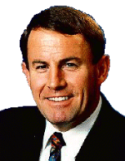John Banks (New Zealand)
|
|
John Archibald Banks (born 2 December 1946) has made a career as a New Zealand politician. For three years (2001 - 2004), he served as mayor of the city of Auckland. Prior to that he had filled posts as a Cabinet Minister in the New Zealand government.
Before politics
Banks, born in Wellington, moved to Auckland while still at high school. In his career before entering politics, he worked as a market researcher in the pharmaceutical industry, as a commercial property developer, and as a restaurant owner. He served for a time as Chairman of the New Zealand Licensed Restaurant and Cabaret Association.
Political career
Banks began his political career in local-body politics with election to the Birkenhead Borough Council. In the 1978 general election, Banks stood as the National Party candidate for the Roskill electorate, but unsuccessfully. In the 1981 election, he stood in a different seat, Whangarei, and won. He would retain this seat for the remainder of his parliamentary career.
When the National Party won the 1990 elections, Banks entered Cabinet, becoming Minister of Police, Minister of Tourism, and Minister of Sport. He quickly gained a high public profile due to his often-controversial views, most of which reflected a highly conservative political outlook. His political opponents accused him of racism towards Maori and immigrants, and of homophobia. Banks also had a troubled relationship with his political colleagues, who disliked what they saw as his aggressive and confrontational style. Banks frequently clashed with Prime Minister Jim Bolger and other senior ministers. In 1996, he resigned from Cabinet, becoming a backbencher. At around the same time he also gained a position as the host of a talkback radio programme.
Banks retired from Parliament at the 1999 elections.
In 2001, he contested and won the Auckland City mayoralty, defeating the incumbent Christine Fletcher (herself also a former National MP). Banks remained controversial in his new rôle, although often regarding financial and management issues rather than social policy. A serious challenge to his mayoralty came from philanthropic cereal-maker Dick Hubbard in late August 2004. Six weeks out from the next election, a New Zealand Herald public opinion poll gave Hubbard 32.2 per cent and Banks 27.3 per cent, with Christine Fletcher the best of the rest, a long way back.
The campaign gained noteriety as one of the "nastiest" and hardest-fought in memory. In September 2004, Banks's campaign manager, Brian Nicolle, resigned amidst allegations of "gutter politics" after he anonymously distributed copies of a newspaper article highly critical of Hubbard to hundreds of letterboxes in Auckland.
The Herald poll's pattern held for most of the campaign as the postal votes came in. On October 9, 2004, Hubbard defeated "Banksie" in his bid to be re-elected as Mayor of Auckland. In early interviews, Banks stated that he would look after his varied business interests.
For a time, rumours suggested that he might return to national politics, standing as a candidate either for the National Party or for ACT New Zealand. Speculation eventually focused on ACT, and there were several meetings between Banks and senior party members. In the end, however, Banks did not become an ACT candidate. He has indicated that he will attempt to regain the Auckland mayoralty.
In February 2005, Banks returned to talkback radio as a short-term host for Radio Pacific.
Personal matters
Banks is married, and has three adopted children. He is a member of Rotary International, and was awarded the Paul Harries Fellow Rotary prize. He is also a member of a Masonic Lodge.

